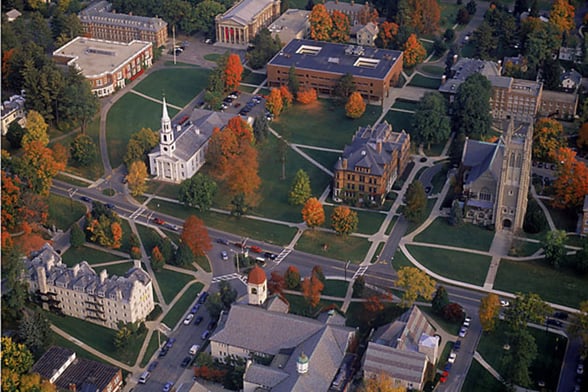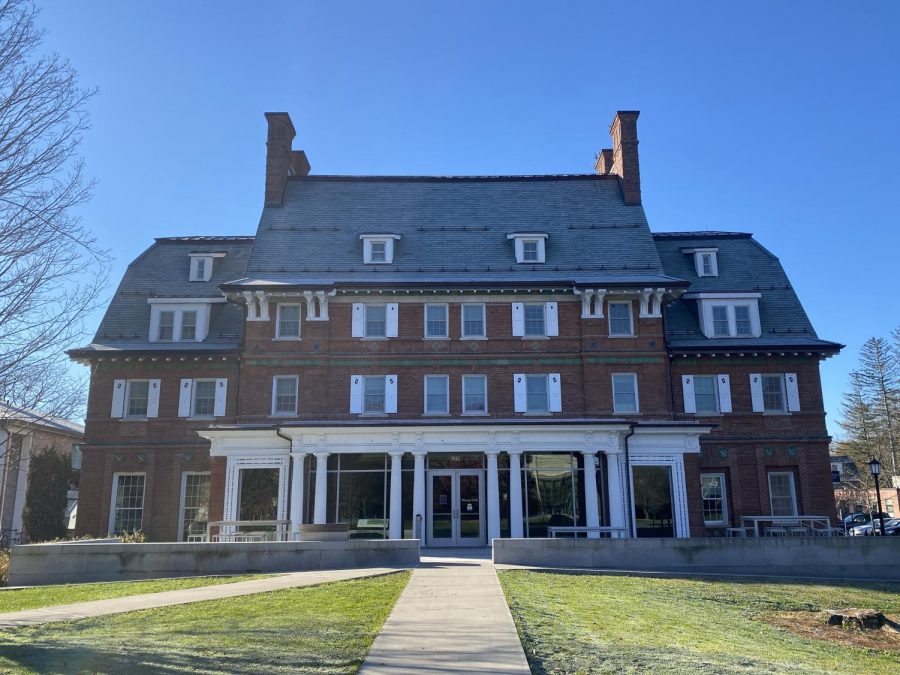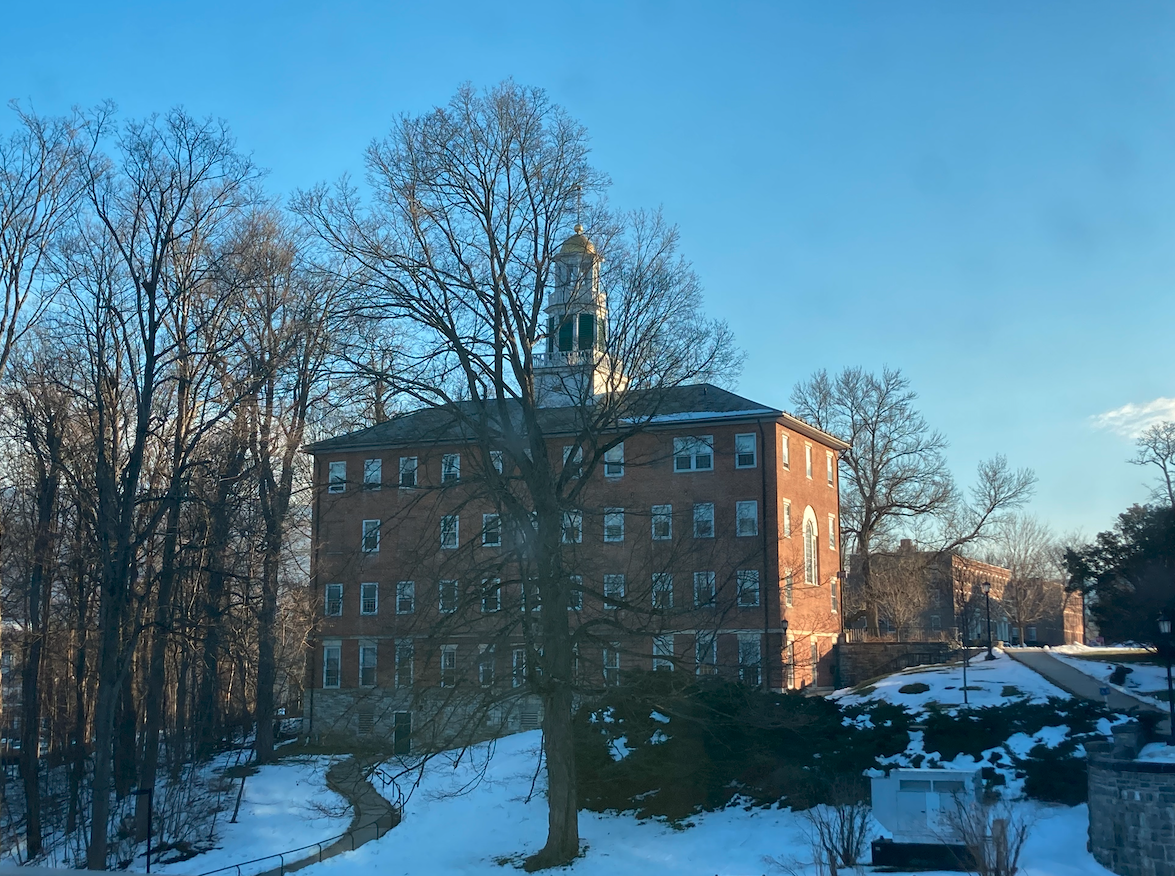

Williams Supplemental Essays 2023-24
Located around 3 hours west of Boston in Williamstown, MA, Williams College is a small, private, liberal arts college. Williams College is known for its small campus and rigorous academics. With the Williams acceptance rate currently at 9% , strong Williams supplemental essays can make a major difference in the admissions process. The Williams supplemental essays work a little differently than those at many other colleges, providing a unique opportunity for students to demonstrate their writing skills.
The Williams essay is not based on a specific prompt. Instead, it invites students to submit an academic paper alongside their application. This Optional Writing Supplement gives students the opportunity to share an example of academic writing with the Williams admissions office . There are no formal Williams essay prompts; instead, the only personal statement Williams will receive is your Common App essay. In this way, the Williams College supplemental essay stands out.
Understanding the Williams supplemental essays
Unlike other schools with defined prompts, the Williams College supplemental essays invite students to share any piece of academic writing 3-5 pages long. The paper can be creative or analytical, and it can cover any topic. Williams accepts both the Common App and the Coalition App , and you can submit the paper through either application. The Williams essay can be a great opportunity to highlight an academic interest or demonstrate your analytical skills.
The Williams College supplemental essay can feel intimidating, especially if you aren’t sure what to submit. While the Williams supplemental essays are optional, we recommend taking advantage of the chance to demonstrate your writing skills. The Williams essay can help the admissions officers get to know you better. It can also let you showcase your passions and academic interests. If you’re feeling stuck on the Williams supplemental essays, this guide will detail the best ways to approach this unique prompt.
Williams Essay Quick Facts:
Williams Acceptance Rate: 9%
Essay Requirements for Williams: No essay required, though students have the option to submit an academic paper alongside application . Students should also submit the Common App essay .
Williams College Application: According to the Williams admissions website , the following are required for first-year applicants before the application deadline :
- School Report
- Counselor Recommendation
- Two Teacher Recommendations
- Mid-Year Report (Due February 8* or for schools on a trimester, when 2nd trimester grades are available)
- $65 Application Fee or Fee Waiver
- Early Decision Agreement Form (Early Decision applicants only)
Williams College is also test-optional, meaning students do not need to submit SAT or ACT scores. Additionally, Williams College is a Questbridge partner , so students may be able to match via their process. If you want to learn more about Questbridge, read our guide here . Additionally, if you have questions about the application process, you can connect with the Williams College admissions office.
Williams Application Deadlines :
- Early Decision: November 15 th
- Regular Decision: January 8 th
- Transfer: March 1 st
Williams College Supplemental Essay Tip: Try to submit an academic paper in the area you plan to study. This can help the admissions officers understand your experience and interest in your intended major. The Williams supplemental essays allow you the unique opportunity to showcase your talents and academic passions. So, choose an academic paper that reflects your goals and interests.
Please note that essay requirements are subject to change each admissions cycle, and portions of this article may have been written before the final publication of the most recent guidelines. For the most up-to-date information on essay requirements, check the university’s admissions website.
Does Williams College have supplemental essays?

The Williams essay is unique in that it is not a traditional supplemental essay. Unlike at other schools, the Williams College supplemental essay is optional and does not follow a prompt. Rather, the Williams supplemental essays are academic papers submitted by students for review.
In the past, the Williams essay prompts followed the more traditional supplemental essay format, asking students to write a community essay. However, the Williams essay has changed in recent years.
The Williams College supplemental essay requirement asks students to submit a 3-5-page academic paper on a topic of their choice. The paper does not need to be graded and can be creative or analytical. As part of the Williams essay prompts, students must also submit an explanation of the assignment or prompt.
The Williams supplemental essays allow students to showcase their analytical and academic writing skills. While the Williams essay is optional, given the competitive Williams acceptance rate, you should plan to submit a Williams College supplemental essay.
Williams Essay Requirements
There is no formal Williams essay requirement—students can submit their Williams application without submitting the Williams supplemental essays. Williams College will also receive your Common App essay, although it is not technically a formal requirement for your application.
While there is no Williams essay requirement, we encourage students to submit a Williams College supplemental essay to help boost their admissions odds.
With the Williams admissions process as competitive as it is, students should think carefully about their Williams College application essay. The Williams supplemental essays allow admissions officers to understand your academic interests. Additionally, the Williams essay lets you showcase a piece of work that you’re proud of and demonstrate your academic writing skills. This means you should take the Williams supplemental essays seriously, even if they are not required for the Williams College application.
Your Williams College supplemental essay can help you stand out in the application process. In many ways, the Williams supplemental essays can provide more insight into a student’s writing ability than traditional essay prompts. The more information you can give to admissions officers, the better. They want to know your academic interests and your writing abilities. You should take advantage of this great opportunity to share something you’re proud of.
Personal Statement vs. Academic Paper

Through the college application process, you will encounter different supplemental essay prompts. While the Williams College application essay is an academic paper, you’ll likely have to write a personal statement such as the Common App essay . Additionally, you’ll also complete supplemental essay prompts for many other colleges. We’ll detail the difference between the personal statement and academic paper and the best way to approach both.
You’ll likely complete your personal statement by responding to one of the Common App essay prompts. Different schools may also require a separate personal statement in addition to the Common App essay. So, it’s important to be prepared to write both. The personal statement is meant as an opportunity for you to introduce yourself and your academic goals to college admissions officers. A well-crafted personal statement should highlight who you are and how you’ll make the most of your college experience, often through the use of a compelling story or anecdote.
Prior Williams essay prompts were structured more like a personal statement. Specifically, these essay prompts were a classic “community essay,” asking how students would enrich the Williams community. However, the current Williams essay portion comprises only the academic paper and personal statement.
Writing a personal statement
The personal statement can be hard to tackle, especially if you’re not familiar with writing about yourself. It’s important to think through why you’re applying to college and what you hope to achieve during your undergraduate career. Consider your high school experience – what clubs, classes, and experiences inform who you are today? Is there something that you’re really proud of that you want to make sure colleges know about? What do you think has prepared you for college? Figuring out the best way to communicate who you are and what you want to accomplish can take some time. So, be sure to start brainstorming early.
Academic papers and college admissions
The academic paper, on the other hand, is not a straightforward introduction to colleges; in fact, it has little to do with the admissions process at all. Your academic paper, moreover, will likely not contain many personal details about you.
In 2023, Williams supplemental essays are academic papers. While they may not provide as much outright information about you, they still play a major role in the admissions review process.
The academic paper allows colleges to see what kind of academic writing skills you have. It also highlights what disciplines you’re interested in. Your paper can help showcase your analytical or creative writing skills, giving admissions officers the chance to see your intellectual curiosity in action. Additionally, the academic paper is a chance for you to show off—is there a paper that you’re super proud of?
You can consult with your teachers on which paper to submit as well. This can provide you with some additional feedback on your Williams college application.
Overall, both the personal statement and academic paper help admissions officers get to know you better, but in very different ways. As an academic paper, the Williams College supplemental essay provides an insight to your analytical skills that is hard to capture in a personal statement.
The college’s switch from formal Williams essay prompts to an academic paper highlights Williams’ emphasis on academic writing. If you’re looking for more help with your personal statement, you can read our How to Write Better Essays guide here . But now, let’s take a closer look at how to tackle the Williams College application essay.
If you’re considering applying to Williams, don’t forget to register for our webinar on Building Your College Applications Timeline!
Williams Supplemental Essays
The Williams College supplemental essay prompt can be found below:
Williams does not require a writing supplement. However, some students feel they do their best writing in an academic context rather than through narrative pieces like admission applications. If you are interested in submitting an example of your academic writing, you may share a 3-5 page paper written in the last year. The paper may be creative or analytical, can cover any topic, and need not be graded. Please include a description of the assignment or prompt. Please do not submit lab reports.
Students can apply and submit this optional writing supplement using the common application, apply coalition with scoir or questbridge application..
Rather than the traditional supplemental essay prompt, the Williams essay asks you to submit an academic paper of your choosing, between 3-5 pages. The Williams essay is unique in that it is optional. It also provides students an opportunity to display their academic writing skills.
Many other colleges have direct prompts for students to answer. However, the Williams supplemental essays require students to decide which of their academic papers represent them best. This can be really difficult, so we’ve compiled some tips on how to pick your Williams College supplemental essay.
1. Align the Williams essay with your major
As the Williams College supplemental essay seeks to showcase your academic writing skills, you should submit an essay that reflects your interests. The Williams supplemental essays help admissions officers decide who may be a good fit for their campus. If you’re able to demonstrate your skills within your intended major, it can help you through the application process. If you haven’t chosen a major, your Williams College application essay can be a paper that you’re particularly proud of.
2. Incorporate any feedback you received
The Williams College supplemental essay does not need to be graded. However, it can be helpful to review any feedback you initially received on the assignment or prompt. If you’re submitting a paper you worked on outside of school, make sure you have someone edit and provide feedback. Don’t hesitate to ask a trusted teacher in the relevant subject to review your essay. Your Williams essay should appear as polished and complete as possible.
3. Pick an essay you’d like to expand on
It’s important that your Williams College supplemental essay communicates your passion for learning and commitment to studying your chosen topic. If there was a school assignment or project you loved, this may be a good choice for your Williams essay. You can also choose to expand on a past assignment for the Williams essay—try to take full advantage of the 3-5-page limit.
4. Consult your teachers
Teachers can provide more than just feedback on the content of your essay. If you’re not sure what to submit for your Williams College supplemental essay, asking your teachers may help. They may be able to provide some guidance on your best work and advise which paper showcases your academic writing the best. If you’re asking one of your teachers for a college recommendation, they may also be able to help you pick your Williams essay.
5. Make sure it’s cohesive
If you choose to submit part of a larger assignment for your Williams College supplemental essay, make sure your section is cohesive. Your Williams essay should have a beginning, middle, and end. This means you may have to edit your paper to make it a standalone Williams College application essay. Focus on your overarching thesis and try to condense any extraneous information.
Does Williams College care about essays?
It’s hard to determine exactly how the Williams supplemental essays factor into the admissions process. With Williams College ranking #1 in National Liberal Arts Colleges, the Williams supplemental essays can help your application stand out. Your Williams College supplemental essay can help admissions officers get to know you better. Given the high Williams College ranking, it’s important to take full advantage of the Williams supplemental essays.

As the Williams College supplemental essay is optional, you may wonder when it would make sense to not submit one. The Williams supplemental essays are meant to help boost your application. So, if you’re not sure if your writing samples are strong, it may be smart to let other aspects of your application shine.
For instance, if you have an art portfolio, it may be a good idea to include this on the Common App and skip the Williams College supplemental essay. If the bulk of your academic writing is the form of lab papers, it may make sense to communicate your accomplishments through your resume or Common App essay. Ultimately, every part of your application from essays to recommendations should shine a spotlight on some aspect of you.
Making the most of the Williams supplemental essays
Be sure to think through your options—any additional information you can provide will help your application paint a more holistic picture of you. The Williams supplemental essays are meant to help provide some context to your academic goals and accomplishments. However, they are not the only way to do this. If you’re on the fence about submitting a Williams supplemental essay, it can be helpful to read through your past assignments. You may find some inspiration and guidance in unlikely places.
Overall, while the Williams College supplemental essay is not required, it can be a great addition to your application. The Williams supplemental essays are a great opportunity for you to showcase your passions and academic writing skills. As long as you start your application well before the deadline , you may be able to write a paper from scratch. That’s right, you can submit an all-new essay for your application. This can help you give Williams a clear picture of your academic interests and intellectual curiosity.
How can I make my Williams College essays stand out?

With the high Williams College ranking, it’s important that your Williams College supplemental essay helps you stand out in the admissions process. Choosing your Williams supplemental essays can be hard, but a well-written paper can make a huge difference in your admissions prospects.
Submitting an academic paper is a unique supplemental essay prompt. So, it’s crucial that you choose your paper wisely. The Williams College supplemental essay can make a key difference in your admissions decision, especially given the school’s low acceptance rate.
It’s important that your supplemental essay communicates both your passion and academic understanding for a particular subject. This can be hard to do, but the clearer this comes across, the stronger the impact. The Williams supplemental essays help demonstrate a student’s academic abilities. In other words, you should pick a paper that best shows your writing and analytical skills. A strong and clear academic paper that reflects your academic goals is the best way to stand out!
If you are looking to learn more about Williams College and hear from the Williams Admissions team check out the video below:
Williams Supplemental Essays – 5 Takeaways
There’s a lot to consider when selecting your Williams College supplemental essay. Here are 5 key takeaways to think about as you approach the Williams supplemental essays:

5 Key Williams Supplemental Essays Takeaways
1. strategize on whether to submit a paper.
Keep in mind that the Williams supplemental essays are optional. However, we recommend that students take advantage of the opportunity that the Williams College supplemental essay offers. Before you decide to forego the supplemental essay, be sure to consult with teachers and advisors on your decision. There are instances where it may make sense to bypass the supplemental essay, but you should think carefully.
2. Foreground your academic writing abilities
The purpose of the Williams supplemental essays is to highlight your academic writing skills. Make sure the paper you select showcases your analytical or creative writing abilities. This is the best way to show Williams College what you’re capable of and to explain why you belong on their campus. Make sure to pick a writing sample that you feel best demonstrates your writing style and critical thinking.
3. Highlight your passions
The Williams College supplemental essay is a great way to showcase your academic prowess. Your essay should convey your passion for a specific subject and emphasize your intellectual curiosity. It should also show admissions officers that you’d be a great addition to the academic body of their campus. The Williams supplemental essays help admissions officers understand your academic passions, so be sure to pick a paper that reflects your goals.
4. Revise, revise, revise
While the Williams supplemental essays do not need to be graded, it’s important that they are edited, proofread, and as polished as they can be. As the supplemental essay reflects your academic writing, you want to make sure that it represents the height of your abilities. Make sure that you incorporate any feedback you received from your teacher if your essay is a school assignment. Share your essay with teachers, mentors, and advisors as well – the more feedback you get, the better!
5. Connecting your essay to your intended major can help
A strong Williams College supplemental essay will help admissions officers envision you on the Williams campus. If you have a strong academic paper in the field of study your major is in, this can help add dimension to your overall profile. A strong essay in your chosen field can make your application more cohesive. It can also highlight your level of understanding and analytical skills within a specific major.
Looking for more support on the Williams supplemental essays? Schedule a meeting with our team for one-on-one guidance on every aspect of the college application process.

This essay guide was written by senior advisor, Jess Klein . Looking for more admissions support? Click here to schedule a free meeting with one of our Admissions Specialists. During your meeting, our team will discuss your profile and help you find targeted ways to increase your admissions odds at top schools. We’ll also answer any questions and discuss how CollegeAdvisor.com can support you in the college application process.
Personalized and effective college advising for high school students.
- Advisor Application
- Popular Colleges
- Privacy Policy and Cookie Notice
- Student Login
- California Privacy Notice
- Terms and Conditions
- Your Privacy Choices
By using the College Advisor site and/or working with College Advisor, you agree to our updated Terms and Conditions and Privacy Policy , including an arbitration clause that covers any disputes relating to our policies and your use of our products and services.
- Search All Scholarships
- Exclusive Scholarships
- Easy Scholarships to Apply For
- No Essay Scholarships
- Scholarships for HS Juniors
- Scholarships for HS Seniors
- Scholarships for College Students
- Scholarships for Grad Students
- Scholarships for Women
- Scholarships for Black Students
- Scholarships
- Student Loans
- College Admissions
- Financial Aid
- Scholarship Winners
- Scholarship Providers
Student-centric advice and objective recommendations
Higher education has never been more confusing or expensive. Our goal is to help you navigate the very big decisions related to higher ed with objective information and expert advice. Each piece of content on the site is original, based on extensive research, and reviewed by multiple editors, including a subject matter expert. This ensures that all of our content is up-to-date, useful, accurate, and thorough.
Our reviews and recommendations are based on extensive research, testing, and feedback. We may receive commission from links on our website, but that doesn’t affect our editors’ opinions. Our marketing partners don’t review, approve or endorse our editorial content. It’s accurate to the best of our knowledge when posted. You can find a complete list of our partners here .
How to Respond to the 2023-2024 Williams College Supplemental Essay Prompts

Varonika Ware is a content writer at Scholarships360. Varonika earned her undergraduate degree in Mass Communications at Louisiana State University. During her time at LSU, she worked with the Center of Academic Success to create the weekly Success Sunday newsletter. Varonika also interned at the Louisiana Department of Insurance in the Public Affairs office with some of her graphics appearing in local news articles.
Learn about our editorial policies

Bill Jack has over a decade of experience in college admissions and financial aid. Since 2008, he has worked at Colby College, Wesleyan University, University of Maine at Farmington, and Bates College.

Located in Williamstown, Massachusetts, Williams College is a private liberal arts college with a 9% acceptance rate . This means that it’s important to set your application apart and you can do that by completing the Williams supplements in a stellar way. Keep reading to learn more about the prompts and get tips on how to write your essay.
The Williams prompt
Williams College offers students the opportunity to submit an optional “paper of choice.” For this option, we go over how to choose an essay that’s a reflection of your best self. For a small selective college like Williams, it is always in your best interest to submit any optional materials. It is just one more opportunity to share about who you are as a person. For a deeper dive into the Williams supplemental essay prompt, keep reading!
“ Optional: Williams does not require a writing supplement. However, some students feel they do their best writing in an academic context rather than through narrative pieces like admission applications. If you are interested in submitting an example of your academic writing, you may share a 3-5 page paper written in the last year. The paper may be creative or analytical, can cover any topic, and need not be graded. Please include a description of the assignment or prompt. Please do not submit lab reports.”
Williams advises their applicants to submit essays that are from the humanities or social sciences, which can include psychology, economics, history, English, and more. Ideally, you should choose an essay that you’re proud of that’s on an interesting topic or has a unique thesis.
Students can work with a guidance counselor or teacher to fine tune their essays before submitting them, especially if they weren’t happy with the grade received. Three to five pages double-spaced is about 1500-2500 words. Keep that in mind just in case you have to add or take off a paragraph or two.
Questions to consider:
- How is this paper a representation of you?
- Does this paper enhance your application?
- What makes this particular essay stand out?
Apply to these scholarships due soon

$10,000 “No Essay” Scholarship

$2,000 Sallie Mae Scholarship

“Get Inspired” TikTok Scholarship

Niche $25,000 “No Essay” Scholarship

SKECHERS Financial Hardship Scholarship

$25k “Be Bold” No-Essay Scholarship

SKECHERS Academic Excellence Scholarship

SKECHERS Athletic Performance Scholarship

$2,000 No Essay CollegeVine Scholarship
Start your scholarship search.
- Vetted scholarships custom-matched to your profile
- Access exclusive scholarships only available to Scholarships360 members
Next steps for applicants
Once you’re done writing your Williams supplement, you should complete your FAFSA and CSS Profile . These two applications can come in handy and play a major part in colleges deciding your financial aid package. Williams also offers their applicants a chance to connect with current students to talk about their experiences and answer any questions. Don’t forget to schedule a campus tour as well to get a feel of the campus before you decide to enroll.
Also see: How to write an essay about yourself
Additional resources
Congratulations on finishing up your Williams College supplements! Since this might not be the only school you’re applying to, check out some of these Scholarships360 resources to help out as you prepare for college.
- Compare your financial aid award letters
- Learn more about writing supplemental essays
- Figure out your future major
Frequently asked questions about the Williams College supplemental essays
How many supplemental essays for williams college, should i submit the williams writing supplement, what kind of papers to submit for the williams' writing supplement, scholarships360 recommended.

10 Tips for Successful College Applications

Coalition vs. Common App: What is the difference?

College Application Deadlines 2023-2024: What You Need to Know
Trending now.

How to Convert Your GPA to a 4.0 Scale

PSAT to SAT Score Conversion: Predict Your Score

What Are Public Ivy League Schools?
3 reasons to join scholarships360.
- Automatic entry to our $10,000 No-Essay Scholarship
- Personalized matching to thousands of vetted scholarships
- Quick apply for scholarships exclusive to our platform
By the way...Scholarships360 is 100% free!

Choose Your Test
Sat / act prep online guides and tips, 3 tips for writing your williams college supplement.
College Essays

Williams is among the most selective colleges in the country. In 2022 , its acceptance rate was only 8.5%. As part of your Williams application, you’ll need to respond to the Williams writing supplement.
In this article, we’ll cover the question that makes up the Williams writing supplement, offer suggestions for what to write about in your essay, and give you tips for crafting the best essay possible.
The Williams Writing Supplement
The Williams writing supplement includes one required “long answer” question (150-300 words). You’ll need to respond to it as part of your application!
Williams believes that in a residential learning community, some of the most important experiences happen while living and learning alongside those different from oneself. Please describe a time when you learned or grew through the process of interacting with someone whose background, identity, lived experience or perspective differs from your own.
As we mentioned, Williams instructs applicants to respond to this question in 150-300 words. Writing this essay is not optional , so you’ll need to make sure you write a thoughtful response before you submit your application!


What Should I Write About in My Williams College Supplement?
Let’s take a look at the Williams College supplement question and discuss what you could write about in it. To recap, here’s how the prompt reads on the application:
Let’s take a look at the Williams College supplement question and discuss what you could write about in it. To recap, here’s how the prompt reads on the application :
Williams believes that in a residential learning community, some of the most important experiences happen while living and learning alongside those different from oneself. Please describe a time when you learned or grew through the process of interacting with someone whose background, identity, lived experience or perspective differs from your own.
The residential learning community program at Williams is designed to help students plug into the Williams community and give you the support you'll need to be successful during your first year. Knowing that, it makes sense that admissions counselors would want to know more about how you'll fit into both your residential community and the Williams student body! Especially since you’ll likely be living among people who are different from you.
The first step to answering this prompt is choosing a person/community and experience to focus on in your essay. You should pick an experience that has both impacted your personal growth in a meaningful way and taught you how to have positive interactions with people who are different from you.
Most of us have had multiple learning experiences with people who are different from us. For instance, you may have had experiences in school, church, clubs or extracurriculars, or even in your family or friend group that brought you in contact with people and perspectives that differed from yours. Try to pick out the experience where you learned something really important–and that taught you something that’s stuck with you over time.
From there, it's time to tell a story . Storytelling is one of the most powerful tools you have to help others understand your values and experiences. That's why we recommend that you tell a story that helps illustrate how the experience you've chosen impacted your life and perspective!
For example, let's say you immigrated to the U.S. as a kid and just recently became a U.S. citizen. Telling the story of what you learned by coming into contact with people who are different from you during that experience will help admissions counselors a) get to know you better, and b) understand your values.
In telling that story, make sure you don't forget to explain how the experience changed your perspective or impacted who you are . This prompt is designed to help admissions counselors get to know you better, so don't be afraid to be authentic and honest!
UPDATE for 2022-2023 Williams Applicants
For students applying to Williams during the 2022/2023 school year, there’s an additional optional writing supplement. This essay is separate from the required long answer question we mentioned above. It appears at the end of the Williams application, and you must submit all required parts of the Common App (including the required long answer response!) before you can upload an optional essay.
On their website , Williams states:
Some students feel they do their best writing in an academic context rather than through narrative pieces like admission applications. If you are interested in submitting an example of your academic writing from the last year, you may share a 3-5 page paper. The paper may be creative or analytical, can cover any topic, and need not be graded. We ask that you include a description of the assignment or prompt. Please do not submit lab reports. Students can apply and submit this optional writing supplement using the Common Application or QuestBridge Application.
As this supplement is optional, you can choose whether or not you want to submit something for it. If you choose not to, it won't negatively affect your application. If you do decide to submit a paper, don't write something new just for this prompt. Choose a school paper you think is a great example of your writing skills, and submit that. You may want to choose a paper that relates to the subject you want to major in at Williams, but that isn't required. Remember to include a description of the assignment, as Williams requests.

Should I Write an Essay for the Optional Williams Writing Supplement?
When you’re working on your Williams College application, you’ll notice that the Williams Academic Writing Supplement is entirely optional. So should you write an essay? Or skip it altogether?
It would be a huge mistake to not write the Williams College supplement. While the instructions do say optional, the statement isn’t really optional. Choosing not to write an essay will make you look like you don’t care that much about being accepted to Williams.
Along the same lines, your Williams writing supplement is a great way to show the admissions committee aspects of your personality that aren’t highlighted in the rest of your application. Take that opportunity! Show the admissions committee why you belong on Williams’ campus.
What Should I Write About in the Optional Williams Writing Supplement?
If you do choose this prompt, there are a few things to consider. First, your paper needs to be A+ level excellent (though it doesn’t necessarily have to be a graded paper!). If there's a paper you have in mind, we recommend talking to your teacher about it before you decide it's the paper you want to submit. They will be able to give you honest feedback and encouragement about your paper and help you ensure it’s in tip top shape before you send it in.
Second, make sure you edit your paper before you send it to Williams. That doesn't mean you need to completely rewrite your paper, but you should make the revisions your teacher mentions on your essay. Also, make sure you proofread, proofread, proofread. Williams will expect your paper to be free of typos and grammatical errors!

Tips for Writing a Strong Williams College Supplement Essay
To write a strong Williams College long answer and optional supplemental essay, you need to make sure your essays are the best possible example of your work. Follow these three tips for writing amazing Williams essays to wow the admissions committee!
#1: Be Authentic
The point of a college essay is for the admissions committee to have the chance to get to know you beyond your test scores, grades, and honors. Your admissions essays are your opportunity to make yourself come alive for the essay readers and to present yourself as a fully fleshed out person.
You should, then, make sure that the person you’re presenting in your college essays is yourself. Don’t try to emulate what you think the committee wants to hear or try to act like someone you’re not.
If you lie or exaggerate, your essay will come across as insincere, which will diminish its effectiveness. Stick to telling real stories about the person you really are, not who you think Williams wants you to be.
#2: Play With Form
The Williams College supplement essays leave a lot of room open for creative expression - use that! You don’t need to stick to a five paragraph essay structure here. You can play with the length and style of your sentences — you could even dabble in poetry if that makes sense!
Whichever form you pick, make sure it fits with the story you’re trying to tell and how you want to express yourself.

#3: Proofread and Polish Your Essay
Your Williams essay should be the strongest example of your work possible. Before you turn in your application, make sure to edit and proofread your essays.
Your work should be free of spelling and grammar errors. Make sure to run your essays through a spelling and grammar check before you submit.
It’s a good idea to have someone else read your Williams College supplement essay, too. You can seek a second opinion on your work from a parent, teacher, or friend. Ask them whether your work represents you as a student and person. Have them check and make sure you haven’t missed any small writing errors. Having a second opinion will help your work be the best it can possibly be.
Final Thoughts
Whether you’re writing the required long answer response or the optional academic supplement, there are a few rules of thumb that apply if you want your responses to be the best they can be.
When writing your Williams College supplement response,
- Be authentic and true to yourself.
- Tell stories that are meaningful to your identity and experience.
- Lie or exaggerate to seem more important.
- Forget to proofread or polish your essay.
What’s Next?
Wondering how to ace the Common Application? No problem! We’ve got you covered with tips and tricks to make your application stand out from the crowd .
Starting your essay is often the hardest part. If you're unsure where to begin, check out this guide to starting a college essay perfectly , and don't be afraid to just dive right in!
If you're applying to Williams College, you're likely applying to other colleges on the East Coast, too. Check out our expert guides to the Duke essay , the Tufts essays , and the Harvard essay .

Hayley Milliman is a former teacher turned writer who blogs about education, history, and technology. When she was a teacher, Hayley's students regularly scored in the 99th percentile thanks to her passion for making topics digestible and accessible. In addition to her work for PrepScholar, Hayley is the author of Museum Hack's Guide to History's Fiercest Females.
Student and Parent Forum
Our new student and parent forum, at ExpertHub.PrepScholar.com , allow you to interact with your peers and the PrepScholar staff. See how other students and parents are navigating high school, college, and the college admissions process. Ask questions; get answers.

Ask a Question Below
Have any questions about this article or other topics? Ask below and we'll reply!
Improve With Our Famous Guides
- For All Students
The 5 Strategies You Must Be Using to Improve 160+ SAT Points
How to Get a Perfect 1600, by a Perfect Scorer
Series: How to Get 800 on Each SAT Section:
Score 800 on SAT Math
Score 800 on SAT Reading
Score 800 on SAT Writing
Series: How to Get to 600 on Each SAT Section:
Score 600 on SAT Math
Score 600 on SAT Reading
Score 600 on SAT Writing
Free Complete Official SAT Practice Tests
What SAT Target Score Should You Be Aiming For?
15 Strategies to Improve Your SAT Essay
The 5 Strategies You Must Be Using to Improve 4+ ACT Points
How to Get a Perfect 36 ACT, by a Perfect Scorer
Series: How to Get 36 on Each ACT Section:
36 on ACT English
36 on ACT Math
36 on ACT Reading
36 on ACT Science
Series: How to Get to 24 on Each ACT Section:
24 on ACT English
24 on ACT Math
24 on ACT Reading
24 on ACT Science
What ACT target score should you be aiming for?
ACT Vocabulary You Must Know
ACT Writing: 15 Tips to Raise Your Essay Score
How to Get Into Harvard and the Ivy League
How to Get a Perfect 4.0 GPA
How to Write an Amazing College Essay
What Exactly Are Colleges Looking For?
Is the ACT easier than the SAT? A Comprehensive Guide
Should you retake your SAT or ACT?
When should you take the SAT or ACT?
Stay Informed
Get the latest articles and test prep tips!
Looking for Graduate School Test Prep?
Check out our top-rated graduate blogs here:
GRE Online Prep Blog
GMAT Online Prep Blog
TOEFL Online Prep Blog
Holly R. "I am absolutely overjoyed and cannot thank you enough for helping me!”
WAITLISTED? Act now. Get expert guidance to write a standout Letter of Continued Interest!

Command Education Guide
How to write the williams college essays, updated for 2023-2024, optional essay prompt:.
Williams does not require a writing supplement. However, some students feel they do their best writing in an academic context rather than through narrative pieces like admission applications. If you are interested in submitting an example of your academic writing from the last year, you may share a 3-5 page paper here. The paper may be creative or analytical, can cover any topic, and need not be graded. We ask that you include a description of the assignment or prompt. Please do not submit lab reports.
Explanation:
Williams provides some guidelines for their optional writing supplement, it must be an academic paper completed in the last year, ideally 3-5 pages long, and cannot be a lab report. These guidelines are still very open ended, so how do you choose which paper is best?
Williams does not require that you submit a graded paper, but selecting an essay on which you received positive feedback can help assure you’re putting your best foot forward. While you should select a paper you did well on, small grade fluctuations shouldn’t be the final deciding factor for the paper you choose to send. Instead, consider whether paper best demonstrates your writing skills and showcases engaging, well-organized content. This content should also be highly original, so avoid papers that contain large quotations of other texts or rely heavily on outside sources, as these won’t be the most thorough examples of your writing abilities!
At Williams, emphasis is placed on interdisciplinary learning, taking control over one’s own education, and deeply exploring topics of interest. When selecting your academic paper, try to find essays that reflect at least one or more of these values. Did you write an English essay that also demonstrates a nuanced understanding of history or science? Did you design your own creative writing project that allowed you to engage with one of your passions? Or maybe you explored a niche subject in great detail, writing a paper that demonstrates your ability to dive into an unfamiliar topic. Take time to go through the papers you’ve written in the last year, and see which align best with Williams’ academic values.
In summary, your Williams essay should
- Be well-written and organized
- Demonstrate original thinking
- Address at least one of Williams key academic values such as interdisciplinary learning, taking control over one’s own education, or deeply exploring a topic of interest.
- Privacy Overview
- Strictly Necessary Cookies

This website uses cookies so that we can provide you with the best user experience possible. Cookie information is stored in your browser and performs functions such as recognizing you when you return to our website and helping our team to understand which sections of the website you find most interesting and useful.
Strictly Necessary Cookie should be enabled at all times so that we can save your preferences for cookie settings.
What are your chances of acceptance?
Calculate for all schools, your chance of acceptance.
Your chancing factors
Extracurriculars.
How to Write the Williams College Supplemental Essays 2019-2020

Williams College is found tucked away in the idyllic college town of Williamstown, a liberal arts college renowned for its undergraduate education. Only 2,000 students attend Williams, allowing for a stellar focus on its undergraduates and a 7:1 student-faculty ratio. Williams was founded in 1793, and through its 226 years of existence, has accrued a deep history and a wealth of tightly held traditions.
Williams College has consistently been ranked the nation’s top liberal arts college by the US News College Ranking. Williams is also highly selective: for their class of 2023, the college only admitted 12.4% of its applicants. Notable alumni include former president James A. Garfield, composer Stephen Sondheim, and photographer Walker Evans.
The early decision deadline for Williams is on November 15th, and the regular decision deadline is on January 1st. Want to know your chances at Williams? Calculate your chances for free right now.
Williams College Supplemental Essay Questions:
Choose one of the following: (300 words)
Option 1: At Williams we believe that bringing together students and professors in small groups produces extraordinary academic outcomes. Our distinctive Oxford-style tutorial classes—in which two students are guided by a professor in deep exploration of a single topic—are a prime example. Each week the students take turns developing independent work—an essay, a problem set, a piece of art—and critiquing their partner’s work. Focused on close reading, writing and oral defense of ideas, more than 60 tutorials a year are offered across the curriculum, with titles like Aesthetic Outrage, Financial Crises: Causes and Cures, and Genome Sciences: At the Cutting Edge. Imagine yourself in a tutorial at Williams. Of anyone in the world, whom would you choose to be your partner in the class, and why?
Option 2: Each Sunday night, in a tradition called Storytime, students, faculty, and staff gather to hear a fellow community member relate a brief story from their life (and to munch on the storyteller’s favorite homemade cookies). What story would you share? What lessons have you drawn from that story, and how would those lessons inform your time at Williams?
Option 3: Every first-year student at Williams lives in an Entry—a thoughtfully constructed microcosm of the student community that’s a defining part of the Williams experience. From the moment they arrive, students find themselves in what’s likely the most diverse collection of backgrounds, perspectives, and interests they’ve ever encountered. What might differentiate you from the 19 other first-year students in an entry? What perspective(s) would you add to the conversation with your peers?
Choosing a single essay may seem daunting at first, as you may wonder if you are choosing the perfect essay prompt that will convey yourself to the reader in the best way possible. However, just like in the Common App personal statement, you may not necessarily have to “choose” your essay. After looking through the prompts and brainstorming parts of your identity and passions that you want to show to the admissions team, you will easily be able to answer any one of the questions, as all three prompts revolve around your personal story, interests, and ambitions, albeit in slightly different fashions. As a result, the prompt choice becomes much less important than distilling your nuances and complexities onto the page.
If you choose this first prompt, there are a couple of points you should make in the essay. First, your possibility of options are infinite in this prompt—as a result, make sure the person and class you settle on reveal important parts of your own background and interests. You definitely want to describe why you chose the person and class you did, but make sure to return the focus back to you, and how you could grow through interacting with this person. The goal of this essay is to allow you to highlight one of your academic interests, so don’t stray too far by fawning over your chosen partner.
Here are some brainstorm questions you should think about before writing:
- Why would you excel in an academic setting with this person?
- What does this person have to teach you, and why you specifically?
- What experiences do you bring to the table to foster a great discussion?
- More broadly, how does the tutorial environment fit your ideal college education?
You should look up the list of tutorials offered for the 2019-2020 school year as a source of valuable information, which is also a good starting place for sparking ideas. If there is a course pertinent to your own interests as well as the person you choose, feel free to mention the course. However, don’t feel limited to these classes, and make up a class topic of your own which you feel like your partner would be an excellent collaborator in (in this case, it could be good to mention a professor whose research deals with the topic you want to focus on).
One note of caution: be wary of choosing incredibly common historical figures: Julius Caesar, Michael Jordan, Abraham Lincoln, Oprah, etc. If you do so, make sure to have a fresh, unique, and persuasive set of reasons as to why you would pick this person. You should also be careful if you decide to talk about very controversial leaders and politicians, past or present. Anything that could evoke strong emotional responses in an outside reader could be risky. On the other hand, if the person you choose is not well known, give a sentence or two introducing to the reader the person’s significance.
Here are some examples:
Example 1: Say you were particularly drawn to the course “Leaving the World Behind: The Literature of Reclusion” because you were always interested in both the relationship between technology and society and literature, your stated major. As a result, you would love to engage in a semester-long course with someone who grew up in an era without constant global communication. To do this, you bring out Saint Francis of Assisi (1181-1226), someone whose texts you poured over while trying to find peace in your own solitude (to no avail). You and Saint Francis, who spent much of his life in solitude and solo travel, could spend each class discussing the relationship between the individual and society, and how this relationship has been negotiated throughout time and space.
Example 2: You could also put a personal twist on the prompt. Say your parents immigrated from Korea, and your Korean identity makes a large portion of who you are. As a result, you choose your grandmother, an incredibly bright woman who fled from North Korea to South Korea as a teenager during the Korean War. As someone planning to study history in college, you want to make sure you learn about your family’s own history and how that fits into a larger framework of foreign policy and global politics. As a result, you would love to take “The Two Koreas” as a tutorial with your grandmother. You would study perceptions of both Koreas from different generations, as well as Koreans in Korea and Koreans living abroad. You also want to know yourself on a deeper level, especially through tracing a legacy of generational war trauma in your family.
Example 3: Say after reading this prompt, instead of focusing on a class topic, you instead immediately think of a person to work with, this person being the Colombian author Gabriel Garcia Marquez. You have read every single one of his novels, interviews, and essays, and yearn to pick the mind of someone you see as the world’s greatest storyteller. However, you wouldn’t want a tutorial class that focuses on his novels, or even the magical realist genre he worked in. Instead, you imagine studying Russian 19th century realist fiction with him, a genre of literature very different in style, but very similar in emotional insight, doing a comparative analysis of sorts. You would also get to hear the plethora of personal stories he could share.
Example 4: Maybe in high school, you fell in love with Richard Feynman’s famous “Feynman Lectures on Physics,” which led you to eventually put your intended major as physics on the Common Application. You would love to take the “Applications of Quantum Mechanics” tutorial with Feynman, who you know to be not just a physicist, but someone with wide-ranging interests in things like Brazilian Samba music and the relationship between science and the government, specifically in his assistance in creating the atomic bomb. As someone who eventually wants to work in NASA’s Jet Propulsion Laboratory, you want not just to grow deeper in your understanding of physics, but more broadly understand the different ways people configure meaning in the world, whether in physics or music or ethics. You find that Richard Feynman, who struggled with these questions his entire life, could help you get closer to these goals of yours.
Option 2: Each Sunday night, in a tradition called Storytime, students, faculty and staff gather to hear a fellow community member relate a brief story from their life (and to munch on the storyteller’s favorite homemade cookies). What story would you share? What lessons have you drawn from that story, and how would those lessons inform your time at Williams?
The second prompt is also incredibly open: talk about something that happened in your life. Of course, you want the story that you pick to have a greater significance beyond the simple narrative, whether this is a coming of age moment, a moment of realization and clarity, or a moment that has indubitably formed the person you are today. As for what constitutes a “brief story,” think about a singular episode that you could tell someone in person in around ten minutes.
As to the last part of the prompt, “how would these lessons inform your time at Williams,” this could take various shapes and forms. Maybe this is simply being a more community-focused human being on campus, or maybe this could mean creating a campus organization that reflects what you learned, or maybe this means coming into Williams a more open-minded person.
If your Common App essay delves into more serious themes involving your identities and your passions, you could possibly use this essay to reveal more lighthearted, fun elements of your personality. Whether or not you do this, the key here is to show, not tell, as you want your essay to read like a gripping campfire story. You could immerse the admissions reader with the present tense, “in the moment” narrative of your story, or you could use the past tense to evoke a more reflective mood.
As a side note, don’t forget the word “brief” here—you probably don’t want an incredibly long-winded story detailing all your major trials and tribulations. Stick to one event that is illustrative of greater themes in your life.
Dig into your past. Here are a few examples:
Example 1: Say you had a poignant breakthrough moment with your father, with whom you never really had a strong relationship before. Your father, an ex-military, stoic man, never really shared his past with you, but one night you asked him about his days in the military, and he told you a hodgepodge of stories both thrilling and depressing. You learned so much about him that night, allowing you to piece together more of your own identity and where you came from. The lessons you learned that night, that vulnerability bridges relationships, would undoubtedly carry over to Williams, where you have the ability to form once-in-a-lifetime friendships.
Example 2: This could also be a “summer shenanigan” type story if it was a particularly formative experience. Say you and your friends, on one particularly boring summer night, decided to buy goldfishes for many of your other friends. After showing up at your friends’ doors, you were met with equal amounts of shock and laughter, but each friend promised to take care of their fish. What started as a prank turned into a bonding moment where a group of friends collectively took charge of the lives of their goldfishes. You could then transition to talking about how this experience, in a weird way, mirrors the tight undergraduate experience provided at Williams, in regards to how everyone is together pursuing a common goal of learning about the world through a liberal arts curriculum. You also believe these ideas would transition well to a tight-knit cultural group on campus, which for you is Williams South Asian Student Association.
Example 3: Maybe you are still learning the lessons of the story you choose, as the story itself has some unfilled pages. Say you came out to your parents, who immediately rejected you as their child. Talk about how, at the time of writing, you are still trying to negotiate your identity with your status in your family, even though your parents find your situation non-negotiable. You could talk about how, if you were afforded the opportunity to attend Williams and escape from your current surroundings, you could have clearer mental headspace, as well as be able to take part in a welcoming and inclusive environment.

Option 3: Every first-year student at Williams lives in an Entry—a thoughtfully constructed microcosm of the student community that’s a defining part of the Williams experience. From the moment they arrive, students find themselves in what’s likely the most diverse collection of backgrounds, perspectives and interests they’ve ever encountered. What might differentiate you from the 19 other first-year students in an entry? What perspective(s) would you add to the conversation with your peers?
In this “what unique things do you contribute to our school?” prompt, you have a few paragraphs to advocate for and brag about yourself. By no means, however, does this essay have to be a glorified achievements list. If you feel uncomfortable bragging about yourself, reframe the prompt as ultimately being candid about your background. You could also frame it as bragging about your family, or a community you were a part of, and using these groups as a way to illustrate your own identity formation.
We can break down this prompt into the three mentioned facets of diversity: backgrounds, perspectives, and interests. These three obviously overlap with each other, as perspectives and interests often come out of background, but think about each of these three aspects and unearth the most compelling parts of yourself that you think makes you unique.
However, don’t be dissuaded if you aren’t the best in the world at a certain activity, or come from a faraway country most people have not heard of. If you speak with candor and love for your roots and passions, a uniqueness in how you frame yourself will cut through to the readers. Even if you feel like your passion/story is common, with 300 words, you can more than adequately illustrate the complexity and uniqueness of your situation.
Here are a few routes you can take with this prompt:
Example 1: Say your primary interest is in math. Even though this interest is common to many, the reasons why math is so fascinating to you is more unique than just liking problem-solving. Instead, you are passionate about math pedagogy, specifically, how current primary and secondary school math education has been twisted and standardized to a point where you believe it is almost a completely different subject from the one you grew up loving. As a result, you started a math circle with middle school students, allowing them to explore the open-ended and creative side of math so different from algebra and geometry, and in the essay, you can use specific anecdotes with students who disliked school math but loved the math they did in their math circle. In regards to bringing diversity, you could talk about how you treat math as simultaneously a STEM and humanities field, and how this seamless fluidity between the two informs much of your personhood.
Example 2: Say music and the performing arts are your primary interests, another set of common interests. Talk about your rocky experience with the indie band you started in high school, and how all of your preconceived notions of glory and greatness were crushed. You could transition into talking about how you learned from this failure, and how you feel ready to even possibly grab some Entry mates and start a band once more.
Example 3: Say you’re a first generation immigrant who lives in New Mexico. You could talk about how you want to retain your cultural heritage although desiring at the same time to live in a completely foreign environment like New England. Coming from Latin America to New England by way of the American Southwest, your fashion and culture would immediately make you stand out from the other, largely coastal students.
Example 4: Maybe you grew up as a racial, sexual, or economic minority in a community, in which you felt a constant brush of hostility. Although this may also not be entirely unique, maybe the community you grew up in was actually known to the country as an inclusive and progressive community, but your personal experience was anything but that.
Example 5: If you do have a niche interest, such as lepidopterology (the study of moths and butterflies), and are an avid butterfly watcher, talk about why this activity is so important to you. Talk about the joy you feel after spotting a certain butterfly you’d been searching for hours for after traveling to a new environment, or the amazement you feel when looking at butterflies in a natural history museum. You could distill the core parts of this activity into a more generalized set of things you have learned—in the case of lepidopterology, it could be dogged persistence, or the pleasure of immersing yourself into nature without technology, or how you found a community with other lepidopterologist who share your passion.
Overall, after talking about your passion or background, make sure to explain why it is so significant to you, and how that would allow the students in your Entry to grow in their own worldviews. You could also talk with excitement about how you too would love to hear the different perspectives of all those in your Entry, and how the Entry system, in general, would allow you to experience the polar opposite of the cloistered, homogenous environment you grew up in.
Want help with your college essays to improve your admissions chances? Sign up for your free CollegeVine account and get access to our essay guides and courses. You can also get your essay peer-reviewed and improve your own writing skills by reviewing other students’ essays.
Related CollegeVine Blog Posts

- Close Menu Search
- Press Record
- Join the Record!

The Williams Record

College admits 7.5 percent of record-high 15,411 applicants to Class of 2028

The College offered admission to 899 students on March 22 during the regular decision round, according to Dean of Admission and Student Financial Services Liz Creighton ’01. Applicants who accept their offers of admission will join the 249 students admitted to the Class of 2028 in December through the College’s early decision admissions process . In total, the College admitted 1,159 students to the Class of 2028.
This year, the College received 14,100 applications in the regular decision round, an increase of more than a third from last year’s 10,315 regular decision applications and the largest volume of regular decision applications since the record 14,305 regular decision applications for the Class of 2026 . Combined with its early decision cycle, the College received 15,411 applicants for the Class of 2028. The Record calculated the total acceptance rate for the 2023-2024 admission cycle as 7.5 percent — down 2.3 percentage points since last year — marking the lowest rate on record. The acceptance rate for the regular decision round was 6.4 percent.
The College received over a third more applicants in the regular decision round for the Class of 2028. (Izzy Polanco/ The Williams Record. Data courtesy of Common Data Set 1998-2024.)
The College’s Office of Communications refrained from releasing its acceptance rate, instead releasing only the number of applicants and accepted students. “It places disproportionate emphasis on the students who weren’t admitted,” Creighton wrote of the acceptance rate statistic in an email to the Record . “We prefer to focus instead on the students to whom we could offer a spot in the class.”
In addition to the 899 students who were accepted last Friday, which includes 14 previously deferred from the early decision round, the College waitlisted 2,300 applicants and denied admission to 10,901 during its regular decision round. The College accepted approximately the same number of students as last year — the target class size being roughly 550 students, which is consistent with recent classes, Creighton wrote.
The Class of 2028 applied amid a changing admission landscape. This admissions cycle marked the fourth year of the College’s test-optional pilot program , giving prospective students the choice to submit standardized test scores with their applications. The program will extend through the 2025-26 admission cycle , which will outlast peer institutions, such as Dartmouth College , Brown University , and Yale University , that have recently reinstated standardized testing requirements for applicants seeking a spot in their first-year classes next year.
This application cycle is the first to follow last June’s Supreme Court decision on race-based admissions practices, which held that practices at Harvard University and the University of North Carolina were unconstitutional and significantly limited the ability for colleges — including Williams — to consider race as a factor in admissions decisions.
In response, the College eliminated its supplemental essay for the 2023-2024 admissions cycle, both because the supplemental essay could restrict accessibility by deterring potential applicants and applicants personal statements already provided “the most texture and detail” about students’ identities, Creighton told the Record in October . In previous years, the College’s application included either a required or optional short written statement.
As a result of the court’s ruling, admissions readers did not have access to information about applicants’ self-disclosed race or ethnicity while reading their applications. However, applicants were still able to discuss experiences related to race in their personal essays as long as “that discussion is concretely tied to a quality of character or unique ability,” as permitted by Chief Justice John Roberts’s majority opinion for the court.
The Office of Communications plans to share its annual profile of the class “at some point around First Days,” Creighton wrote to the Record . In past years , the profile has included demographics like the percentage of U.S. students of color that comprise the Class of 2028, in addition to other admission statistics.
This year, the Federal Student Aid Information Center announced a “significant overhaul” of the Free Application for Federal Student Aid (FAFSA) system, including a revision of the formula for need analysis. As a result of the redesign, the FAFSA form was unavailable for applicants and their families to fill out until Jan. 1 — a significant delay from the usual timeline, which typically begins in early October.
In response, the College did not require prospective students to submit FAFSA to be considered for financial aid. Instead, the College provided finalized financial aid awards to admitted students based on information in their College Scholarship Service Profile through the College Board. Williams will only require FAFSA from students applying for financial aid this year who enroll in the Class of 2028 and will require them to submit the form “later this summer,” Creighton wrote.
Admitted students will also have until May 15 to respond to their offer of admission — two weeks later than normal — the College announced on Feb. 10. “We recognize that awards from many other schools will be delayed and we want to give students and families every opportunity to compare their offers of admission and financial aid awards across all of the schools they’ve been admitted to,” Creighton wrote.
Despite these changes to this year’s admissions landscape, the College expects its yield for the Class of 2028 to remain consistent with previous years. “Williams’ yield has been remarkably steady for the last several decades and we don’t anticipate that will change this year, but obviously there has been a lot of change in the admission landscape over the past few years so we’ll certainly be keeping a close eye on how things evolve in the coming weeks,” Creighton wrote.
Admitted students are invited to campus for Williams Previews, beginning on April 14, where prospective students tour campus, attend classes, and hear from various student groups and administration members. This year’s iteration will be the third-consecutive in person Williams Previews programming since the COVID-19 pandemic halted campus tours in 2020. For the fourth consecutive year, the Office of Admission will also hold Virtual Previews on April 18, which will feature virtual versions of several sessions typically offered on-campus each spring.
“We’re delighted that so many admitted students are already registered to join us for Previews programming, both on campus and virtually,” Creighton wrote. “It’ll be a terrific opportunity for them to get a sense of whether they can imagine themselves at Williams and for the members of our community to get to know these extraordinary students whose curiosity, talent, work ethic, and kindness truly wowed members of the admission committee.”

The Student-Run Newspaper of Williams College Since 1887
- Anonymous Tip Line
- Advertising
- Subscriptions
- Editorial Policy
Comments (0)

Supplemental Essay Guide 2023-24
What do the 2023-24 supplemental essay prompts really mean, and how should you approach them? CEA's experts are here to break them all down.
Acceptance Rate
Undergrad population.
- Liberal Arts (51)
* Tuition filtering is based on out-of-state fees
Agnes Scott College 2023-24 Supplemental Essay Prompt Guide
Alvernia University 2023-24 Supplemental Essay Prompt Guide
American university 2023-24 supplemental essay prompt guide, amherst college 2023-24 supplemental essay prompt guide, babson college 2023-24 supplemental essay prompt guide, bard college 2023-24 supplemental essay prompt guide , barnard college 2023-24 supplemental essay guide, baylor university 2023-24 supplemental essay prompt guide , bennington college 2023-24 supplemental essay guide, bentley university 2023-24 supplemental essay prompt guide, berry college 2023-24 supplemental essay prompt guide, bethany college 2023-24 supplemental essay prompt guide, bishop’s university 2023-24 supplemental essay prompt guide, boston college (bc) 2023-24 supplemental essay prompt guide, boston university (bu) 2023-24 supplemental essay prompt guide, bowdoin college 2023-24 supplemental essay guide, brandeis university 2023-24 supplemental essay prompt guide , brown university 2023-24 supplemental essay prompt guide, bryn mawr college 2023-24 supplemental essay prompt guide, bucknell university 2023-24 supplemental essay prompt guide, butler university 2023-24 supplemental essay prompt guide, california institute of technology (caltech) 2023-24 supplemental essay prompt guide, california lutheran university 2023-24 supplemental essay prompt guide, capitol technology university 2023-24 supplemental essay guide, carleton college 2023-24 supplemental essay guide, carnegie mellon university 2023-24 supplemental essay prompt guide , catawba college 2023-24 supplemental essay prompt guide, centre college 2023-24 supplemental essay prompt guide, chapman university 2023-24 supplemental essay prompt guide, claremont mckenna college 2023-24 supplemental essay guide , clark university 2023-24 supplemental essay prompt guide, college of mount saint vincent 2023-24 supplemental essay prompt guide, college of william & mary 2023-24 supplemental essay prompt guide, college of wooster 2023-24 supplemental essay prompt guide, colorado college 2023-24 supplemental essay guide, colorado school of mines 2023-24 supplemental essay prompt guide, columbia university 2023-24 supplemental essay prompt guide, cornell university 2023-24 supplemental essay prompt guide, culver-stockton college 2023-24 supplemental essay prompt guide, d’youville university 2023-24 supplemental essay prompt guide, dartmouth college 2023-24 supplemental essay prompt guide, davidson college 2023-24 supplemental essay guide, drexel university 2023-24 supplemental essay prompt guide, duke university 2023-24 supplemental essay prompt guide, earlham college 2023-24 supplemental essay prompt guide, elon university 2023-24 supplemental essay prompt guide, emerson college 2023-24 supplemental essay prompt guide, emory university 2023-24 supplemental essay prompt guide, flagler college 2023-24 supplemental essay prompt guide, fordham university 2023-24 supplemental essay prompt guide, george mason university 2023-24 supplemental essay prompt guide, georgetown university 2023-24 essay prompt guide, georgia state university 2023-24 supplemental essay prompt guide , georgia tech 2023-24 supplemental essay prompt guide, gonzaga university 2023-24 supplemental essay prompt guide, harvard university 2023-24 supplemental essay prompt guide, harvey mudd college 2023-24 supplemental essay prompt guide, haverford college 2023-24 supplemental essay guide, hillsdale college 2023-24 supplemental essay prompt guide , hofstra university 2023-24 supplemental essay prompt guide, illinois institute of technology 2023-24 supplemental essay prompt guide, illinois wesleyan university 2023-24 supplemental essay prompt guide, indiana university bloomington 2023-24 supplemental essay guide, ithaca college 2023-24 supplemental essay prompt guide, johns hopkins university 2023-24 supplemental essay prompt guide, kalamazoo college 2023-24 supplemental essay prompt guide, lafayette college 2023-24 supplemental essay prompt guide, lehigh university 2023-24 supplemental essay prompt guide, lewis and clark college 2023-24 supplemental essay prompt guide, linfield university 2023-24 supplemental essay guide, loyola marymount university (lmu) 2023-24 supplemental essay prompt guide , lynn university 2023-24 supplemental essay prompt guide, macalester college 2023-24 supplemental essay prompt guide, malone university 2023-24 supplemental essay prompt guide, manchester university 2023-24 supplemental essay prompt guide, marist college 2023-24 supplemental essay guide, mary baldwin university 2023-24 supplemental essay guide, massachusetts institute of technology (mit) 2023-24 essay prompt guide, meredith college 2023-24 supplemental essay guide, monmouth college 2023-24 supplemental essay guide, moravian university 2023-24 supplemental essay prompt guide, morehouse college 2023-24 supplemental essay prompt guide, mount holyoke college 2023-24 supplemental essay prompt guide, new york university (nyu) 2023-24 supplemental essay prompt guide, north park university 2023-24 supplemental essay prompt guide, northwestern university 2023-24 supplemental essay prompt guide, occidental college 2023-24 supplemental essay guide, oklahoma city university 2023-24 supplemental essay guide, olin college of engineering 2023-24 supplemental essay prompt guide, pepperdine university 2023-24 supplemental essay prompt guide, pitzer college 2023-24 supplemental essay prompt guide, pomona college 2023-24 supplemental essay guide, princeton university 2023-24 supplemental essay prompt guide, providence college 2023-24 supplemental essay prompt guide, purdue university 2023-24 supplemental essay prompt guide, rensselaer polytechnic institute 2023-24 supplemental essay prompt guide, rice university 2023-24 supplemental essay prompt guide, saint elizabeth university 2023-24 supplemental essay prompt guide, santa clara university 2023-24 supplemental essay guide, sarah lawrence college 2023-24 supplemental essay guide, scripps college 2023-24 supplemental essay prompt guide, seattle pacific university 2023-24 supplemental essay guide, smith college 2023-24 supplemental essay prompt guide, soka university of america 2023-24 supplemental essay prompt guide, southern methodist university 2023-24 supplemental essay guide, st. john’s college 2023-24 supplemental essay prompt guide, stanford university 2023-24 supplemental essay prompt guide, stonehill college 2023-24 supplemental essay prompt guide , swarthmore college 2023-24 supplemental essay prompt guide, syracuse university 2023-24 supplemental essay prompt guide, texas a&m university 2023-24 supplemental essay prompt guide, texas christian university 2023-24 supplemental essay prompt guide, the college of idaho 2023-24 supplemental essay prompt guide , the george washington university 2023-24 supplemental essay guide, the new school 2023-24 supplemental essay prompt guide, trinity college 2023-24 supplemental essay prompt guide, tufts university 2023-24 supplemental essay prompt guide, tulane university 2023-24 supplemental essay prompt guide, university of california 2023-24 essay prompt guide, university of central florida 2023-24 supplemental essay prompt guide, university of chicago 2023-24 supplemental essay prompt guide, university of cincinnati 2023-24 supplemental essay prompt guide, university of colorado boulder 2023-24 supplemental essay prompt guide, university of florida 2023-24 supplemental essay prompt guide, university of georgia 2023-24 supplemental essay prompt guide, university of illinois urbana-champaign 2023-24 supplemental essay guide, university of maryland 2023-24 supplemental essay prompt guide, university of massachusetts amherst 2023-24 supplemental essay prompt guide, university of miami 2023-24 supplemental essay prompt guide , university of michigan 2023-24 supplemental essay prompt guide, university of minnesota twin cities 2023-24 supplemental essay prompt guide , university of north carolina (unc) 2023-24 supplemental essay prompt guide, university of north carolina at charlotte 2023-24 supplemental essay prompt guide, university of north carolina at greensboro 2023-24 supplemental essay prompt guide, university of notre dame 2023-24 supplemental essay prompt guide, university of oklahoma 2023-24 supplemental essay prompt guide , university of oregon 2023-24 supplemental essay prompt guide, university of pennsylvania (upenn) 2023-24 supplemental essay prompt guide, university of pittsburgh 2023-24 supplemental essay prompt guide , university of richmond 2023-24 supplemental essay guide, university of san diego 2023-24 supplemental essay prompt guide , university of san francisco 2023-24 supplemental essay prompt guide, university of southern california (usc) 2023-24 supplemental essay prompt guide, university of texas at austin 2023-24 essay prompt guide, university of tulsa 2023-24 supplemental essay prompt guide, university of vermont 2023-24 supplemental essay prompt guide, university of virginia (uva) 2023-24 supplemental essay prompt guide, university of washington (uw) 2023-24 supplemental essay prompt guide, university of wisconsin-madison 2023-24 supplemental essay prompt guide, vanderbilt university 2023-24 supplemental essay prompt guide, vassar college 2023-24 supplemental essay prompt guide, villanova university 2023-24 supplemental essay prompt guide, virginia tech 2023-24 supplemental essay prompt guide, wake forest university 2023-24 supplemental essay prompt guide, washington and lee university 2023-24 supplemental essay guide, washington university in st. louis 2023-24 supplemental essay prompt guide, wellesley college 2023-24 supplemental essay prompt guide, worcester polytechnic institute (wpi) 2023-24 supplemental essay prompt guide, yale university 2023-24 supplemental essay prompt guide.
Contact us to learn more about our one-on-one advising services!
- I am a * Parent Potential Partner School Counselor
- Name * First Last
- Phone Type Mobile Landline
- Street Address
- Address City State / Province / Region Afghanistan Albania Algeria American Samoa Andorra Angola Anguilla Antarctica Antigua and Barbuda Argentina Armenia Aruba Australia Austria Azerbaijan Bahamas Bahrain Bangladesh Barbados Belarus Belgium Belize Benin Bermuda Bhutan Bolivia Bonaire, Sint Eustatius and Saba Bosnia and Herzegovina Botswana Bouvet Island Brazil British Indian Ocean Territory Brunei Darussalam Bulgaria Burkina Faso Burundi Cabo Verde Cambodia Cameroon Canada Cayman Islands Central African Republic Chad Chile China Christmas Island Cocos Islands Colombia Comoros Congo Congo, Democratic Republic of the Cook Islands Costa Rica Croatia Cuba Curaçao Cyprus Czechia Côte d'Ivoire Denmark Djibouti Dominica Dominican Republic Ecuador Egypt El Salvador Equatorial Guinea Eritrea Estonia Eswatini Ethiopia Falkland Islands Faroe Islands Fiji Finland France French Guiana French Polynesia French Southern Territories Gabon Gambia Georgia Germany Ghana Gibraltar Greece Greenland Grenada Guadeloupe Guam Guatemala Guernsey Guinea Guinea-Bissau Guyana Haiti Heard Island and McDonald Islands Holy See Honduras Hong Kong Hungary Iceland India Indonesia Iran Iraq Ireland Isle of Man Israel Italy Jamaica Japan Jersey Jordan Kazakhstan Kenya Kiribati Korea, Democratic People's Republic of Korea, Republic of Kuwait Kyrgyzstan Lao People's Democratic Republic Latvia Lebanon Lesotho Liberia Libya Liechtenstein Lithuania Luxembourg Macao Madagascar Malawi Malaysia Maldives Mali Malta Marshall Islands Martinique Mauritania Mauritius Mayotte Mexico Micronesia Moldova Monaco Mongolia Montenegro Montserrat Morocco Mozambique Myanmar Namibia Nauru Nepal Netherlands New Caledonia New Zealand Nicaragua Niger Nigeria Niue Norfolk Island North Macedonia Northern Mariana Islands Norway Oman Pakistan Palau Palestine, State of Panama Papua New Guinea Paraguay Peru Philippines Pitcairn Poland Portugal Puerto Rico Qatar Romania Russian Federation Rwanda Réunion Saint Barthélemy Saint Helena, Ascension and Tristan da Cunha Saint Kitts and Nevis Saint Lucia Saint Martin Saint Pierre and Miquelon Saint Vincent and the Grenadines Samoa San Marino Sao Tome and Principe Saudi Arabia Senegal Serbia Seychelles Sierra Leone Singapore Sint Maarten Slovakia Slovenia Solomon Islands Somalia South Africa South Georgia and the South Sandwich Islands South Sudan Spain Sri Lanka Sudan Suriname Svalbard and Jan Mayen Sweden Switzerland Syria Arab Republic Taiwan Tajikistan Tanzania, the United Republic of Thailand Timor-Leste Togo Tokelau Tonga Trinidad and Tobago Tunisia Turkmenistan Turks and Caicos Islands Tuvalu Türkiye US Minor Outlying Islands Uganda Ukraine United Arab Emirates United Kingdom United States Uruguay Uzbekistan Vanuatu Venezuela Viet Nam Virgin Islands, British Virgin Islands, U.S. Wallis and Futuna Western Sahara Yemen Zambia Zimbabwe Åland Islands Country
- Which kind of private school application are you working on? * Preschool Primary School (K - 8) High School (9 - 12)
- How did you find CEA? Internet Search New York Times Guidance counselor/school Social Media YouTube Friend Special Event Delehey College Consulting Other
- Our Approach & Team
- Undergraduate Testimonials
- Postgraduate Testimonials
- Where Our Students Get In
- CEA Gives Back
- Undergraduate Admissions
- Graduate Admissions
- Private School Admissions
- International Student Admissions
- Common App Essay Guide
- Supplemental Essay Guides
- Coalition App Guide
- The CEA Podcast
- YouTube Tutorials
- Admissions Stats
- Notification Trackers
- Deadline Databases
- College Essay Examples
- Academy and Worksheets
- Waitlist Guides
- Get Started
MIT Supplemental Essays 2023-24 – Prompts and Tips
September 8, 2023

When applying to MIT, a school with a 4% acceptance rate where a 1500 SAT would place you below the average enrolled student (seriously), teens should be aware that it takes a lot to separate yourself from the other 26,000+ applicants you are competing against. While trying to be among the 1 in 25 who will ultimately be accepted sounds like (and is) a rather intimidating proposition, every year around 1,300 individuals accomplish this epic feat. We’ve worked with many of these students personally and can tell you one thing they all had in common—exceptionally strong MIT supplemental essays.
(Want to learn more about How to Get Into MIT? Visit our blog entitled: How to Get Into MIT: Admissions Data and Strategies for all of the most recent admissions data as well as tips for gaining acceptance.)
There are few schools that offer as many essays as the Massachusetts Institute of Technology. All applicants are required to respond to five prompts as they work through the MIT application. Your mission is to write compelling, standout compositions that showcase your superior writing ability and reveal more about who you are as an individual. Below are the MIT supplemental essays for the 2023-24 admissions cycle along with tips about how to address each one.
MIT Supplemental Essays – Prompt #1:
We know you lead a busy life, full of activities, many of which are required of you. Tell us about something you do simply for the pleasure of it. (200-250 words)
There are many different ways that you can approach this prompt, but the first step is to take MIT at their word that they are sincerely interested in what you do “simply for the pleasure of it.” While this may be something that also happens to be high-minded and/or STEM-oriented in nature, there is no expectation that this will be the case.
In essence, you want to ask yourself, what brings you great pleasure and happiness? Universal experiences of joy like family, a beautiful sunset, smiling children, or your cat or dog curled on your lap are perfectly acceptable answers here. However, you could also talk about dreams for the future, more bittersweet moments, abstract thoughts, moments of glorious introversion, or even something semi-embarrassing and vulnerable. The only “wrong” answer to this question would be an insincere one. As you enter the brainstorming phase, just make sure to turn off your “resume mode” setting. Instead, allow yourself to embrace the limitless possibilities of this essay.
Essay Prompt #2
What field of study appeals to you the most right now? Tell us more about why this field of study at MIT appeals to you. (Note: You’ll select your preferred field of study from a drop-down list.) (100 words or fewer)
Generally speaking, we all have a story of what drives us to pursue a certain academic pathway and career. How did your interest initially develop? What was the spark? How have you nurtured this passion and how has it evolved over time? If you desire to go into engineering, this is a chance to talk about everything from your childhood fascination with how things work to your participation in an award-winning robotics program at your high school. Share a compelling (and, of course, true!) narrative about how your love of your future area of study has blossomed to its present levels.
In other words, this essay should show evidence of intense hunger for knowledge that extends well outside of the classroom. How do you learn about your favorite subjects? What books have you read on the subject? Which podcasts have you listened to? What museums have you visited?
You can also tie your passions into specific academic opportunities at MIT including courses , professors , hands-on research programs , or any other aspects of your desired major that appeals most to you.
MIT Supplemental Essays – Prompt #3
MIT brings people with diverse backgrounds together to collaborate, from tackling the world’s biggest challenges to lending a helping hand. Describe one way you have collaborated with others to learn from them, with them, or contribute to your community together. (225 words)
How you interact with your present surroundings is the strongest indicator of what kind of community member you will be in your future collegiate home. This prompt asks you to discuss how you have collaborated with others (in any setting) in order to learn from them or contribute to a particular community. This could mean how you’ve collaborated with others during a group project, internship, extracurricular opportunity, sports event, or service project, to name a few.
Some words of warning: don’t get too grandiose in explaining the positive change that you brought about. Of course, if you and your team truly brought peace to a war-torn nation or influenced climate change policy on a global scale, share away. However, nothing this high-profile is expected. Essentially, MIT wants to understand how you’ve worked with other people—in any capacity—to expand your thinking or reach a common goal.
A few potential ideas for areas where you may have worked with/alongside others include:
- Racial injustice
- Assisting those with special needs
- Climate justice/the environment
- Making outsiders in a group feel welcome
- The economically disadvantaged
- Mental health awareness
- Clean-up projects
- Tutoring peers or younger students
- Charitable work through a religious organization
This is, of course, by no means a comprehensive list of potential topics. Most importantly, your story should be personal, sincere, and revealing of your core character and developing values system.
Essay Prompt #4
How has the world you come from—including your opportunities, experiences, and challenges—shaped your dreams and aspirations? (225 words or fewer)
This essay encourages you to describe how your world has shaped your aspirations. We all have any number of “worlds” to choose from, and MIT is inviting you to share more about one of these worlds through the lens of how that has shaped your dreams and aspirations.
Take note of the wide-open nature of this prompt. You are essentially invited to talk about any of the following topics:
- A perspective you hold
- An experience/challenge you had
- A community you belong to
- Your cultural background
- Your religious background
- Your family background
- Your sexual orientation or gender identity
Although this prompt’s open floor plan may feel daunting, a good tactic is to first consider what has already been communicated within on other areas of your application. What important aspect(s) of yourself have not been shared (or sufficiently discussed)? The admissions officer reading your essay is hoping to connect with you through your written words, so—within your essay’s reflection—be open, humble, thoughtful, inquisitive, emotionally honest, mature, and/or insightful about what you learned and how you grew.
You’ll then need to discuss how your chosen “world” has influenced your future, and in what ways.
MIT Supplemental Essays – Prompt #5
How did you manage a situation or challenge that you didn’t expect? What did you learn from it? (225 words)
Note this prompt’s new wording: How did you manage a situation or challenge that you didn’t expect ? Can you think of a time when you felt surprisingly overwhelmed? When something out-of-the-ordinary occurred? When you were caught off guard? Basically, MIT is trying to discover how you deal with unforeseen setbacks, and the important thing to keep in mind is that the challenge/story itself is less important than what it reveals about your character and personality.
Of course, some teens have faced more challenges than others, potentially related to an illness or medical emergency, frequent moving, socioeconomic situation, natural disaster, or learning disability, to name a few. However, you don’t have to have faced a significant challenge to write a compelling essay (and even if you have faced a significant challenge, you don’t have to write about it if you’re not comfortable doing so). Writing about a common topic like getting cut from a sports team, struggling in a particular advanced course, or facing an obstacle within a group project or extracurricular activity is perfectly fine. Any story told in an emotionally compelling, honest, and connective manner can resonate with an admissions reader. The bottom line here is that there are no trite topics, only trite answers.
Given the 225-word limit, your essay needs to be extremely tight and polished. In all likelihood, getting this one precisely right will involve a round or two of revision, ideally with some insight/feedback from a trusted adult or peer in the process.
Some tips to keep in mind include:
- Firstly, make sure you share what you were feeling and experiencing. This piece should demonstrate openness and vulnerability.
- Additionally, you don’t need to be a superhero in the story. You can just be an ordinary human trying their best to learn how to navigate a challenging world.
- Don’t feel boxed into one particular structure for this essay. The most common (which there is nothing wrong with), is 1) introducing the problem 2) explaining your internal and external decision-making in response to the problem 3) Revealing the resolution to the problem and what you learned along the way.
- Lastly, don’t be afraid that your “problem” might sound “trite” in comparison to those of others. This essay is about you. Y our job is to make sure that your response to the problem shows your maturity and resilience in an authentic way. That matters far more than the original challenge itself.
Essay Prompt #6 (Optional)
Please tell us more about your cultural background and identity in the space below. (150 words)
Unlike other optional essays, this one truly is optional. You don’t need to respond unless you have something significant to share about your cultural background and identity that hasn’t already been shared elsewhere on the application.
How important are the MIT supplemental essays?
There are 8 factors that MIT considers to be “very important” to their evaluation process. They are: rigor of secondary school record, class rank, GPA, standardized test scores, recommendations, extracurricular activities, and most relevant to this blog—the MIT supplemental essays.
Moreover, character/personal qualities are the only factor that is “very important” to the MIT admissions committee. Of course, part of how they assess your character and personal qualities is through what they read in your essays.
Want personalized assistance with your MIT supplemental essays?
In conclusion, if you are interested in working with one of College Transitions’ experienced and knowledgeable essay coaches as you craft your MIT supplemental essays, we encourage you to get a quote today.
- College Essay

Dave Bergman
Dave has over a decade of professional experience that includes work as a teacher, high school administrator, college professor, and independent educational consultant. He is a co-author of the books The Enlightened College Applicant (Rowman & Littlefield, 2016) and Colleges Worth Your Money (Rowman & Littlefield, 2020).
- 2-Year Colleges
- Application Strategies
- Best Colleges by Major
- Best Colleges by State
- Big Picture
- Career & Personality Assessment
- College Search/Knowledge
- College Success
- Costs & Financial Aid
- Dental School Admissions
- Extracurricular Activities
- Graduate School Admissions
- High School Success
- High Schools
- Law School Admissions
- Medical School Admissions
- Navigating the Admissions Process
- Online Learning
- Private High School Spotlight
- Summer Program Spotlight
- Summer Programs
- Test Prep Provider Spotlight

“Innovative and invaluable…use this book as your college lifeline.”
— Lynn O'Shaughnessy
Nationally Recognized College Expert
College Planning in Your Inbox
Join our information-packed monthly newsletter.
I am a... Student Student Parent Counselor Educator Other First Name Last Name Email Address Zip Code Area of Interest Business Computer Science Engineering Fine/Performing Arts Humanities Mathematics STEM Pre-Med Psychology Social Studies/Sciences Submit

Victor Mukhin
- Scientific Program

Title : Active carbons as nanoporous materials for solving of environmental problems
However, up to now, the main carriers of catalytic additives have been mineral sorbents: silica gels, alumogels. This is obviously due to the fact that they consist of pure homogeneous components SiO2 and Al2O3, respectively. It is generally known that impurities, especially the ash elements, are catalytic poisons that reduce the effectiveness of the catalyst. Therefore, carbon sorbents with 5-15% by weight of ash elements in their composition are not used in the above mentioned technologies. However, in such an important field as a gas-mask technique, carbon sorbents (active carbons) are carriers of catalytic additives, providing effective protection of a person against any types of potent poisonous substances (PPS). In ESPE “JSC "Neorganika" there has been developed the technology of unique ashless spherical carbon carrier-catalysts by the method of liquid forming of furfural copolymers with subsequent gas-vapor activation, brand PAC. Active carbons PAC have 100% qualitative characteristics of the three main properties of carbon sorbents: strength - 100%, the proportion of sorbing pores in the pore space – 100%, purity - 100% (ash content is close to zero). A particularly outstanding feature of active PAC carbons is their uniquely high mechanical compressive strength of 740 ± 40 MPa, which is 3-7 times larger than that of such materials as granite, quartzite, electric coal, and is comparable to the value for cast iron - 400-1000 MPa. This allows the PAC to operate under severe conditions in moving and fluidized beds. Obviously, it is time to actively develop catalysts based on PAC sorbents for oil refining, petrochemicals, gas processing and various technologies of organic synthesis.
Victor M. Mukhin was born in 1946 in the town of Orsk, Russia. In 1970 he graduated the Technological Institute in Leningrad. Victor M. Mukhin was directed to work to the scientific-industrial organization "Neorganika" (Elektrostal, Moscow region) where he is working during 47 years, at present as the head of the laboratory of carbon sorbents. Victor M. Mukhin defended a Ph. D. thesis and a doctoral thesis at the Mendeleev University of Chemical Technology of Russia (in 1979 and 1997 accordingly). Professor of Mendeleev University of Chemical Technology of Russia. Scientific interests: production, investigation and application of active carbons, technological and ecological carbon-adsorptive processes, environmental protection, production of ecologically clean food.
Quick Links
- Conference Brochure
- Tentative Program


IMAGES
COMMENTS
For Fall 2024 First-Year and Transfer Applicants Williams does not require a writing supplement. However, some students feel they do their best writing in an academic context rather than through narrative pieces like admission applications. If you are interested in submitting an example of your academic writing, you may share a 3-5 page paper written in the last year. The paper may be creative ...
It was a school assignment. For the 2023-24 application season, Williams is not requiring a written supplement to the Common App — or even offering the option of doing one. Instead, they're letting you send in your homework. Not your homework, exactly, but a paper you've already done and that you are (ideally) immensely proud of and ...
The Williams College supplemental essay requirement asks students to submit a 3-5-page academic paper on a topic of their choice. The paper does not need to be graded and can be creative or analytical. As part of the Williams essay prompts, students must also submit an explanation of the assignment or prompt.
Located in Williamstown, Massachusetts, Williams College is a private liberal arts college with a 9% acceptance rate. This means that it's important to set your application apart and you can do that by completing the Williams supplements in a stellar way. Keep reading to learn more about the prompts and get tips on how to write your essay.
Williams College 2022-23 Application Essay Question. Williams does not require a writing supplement. However, students who are interested in submitting an example of their written work have the option of sharing an academic paper completed within the last year, ideally 3-5 pages in length. The paper does not need to be graded, and can be ...
Williams does not require a writing supplement. However, some students feel they do their best writing in an academic context rather than through narrative pieces like admission applications. If you are interested in submitting an example of your academic writing from the last year, you may share a 3-5 page paper here.
UPDATE for 2022-2023 Williams Applicants. For students applying to Williams during the 2022/2023 school year, there's an additional optional writing supplement. ... The Williams College supplement essays leave a lot of room open for creative expression - use that! You don't need to stick to a five paragraph essay structure here.
CollegeVine College Essay Team August 23, 2023 2 Essay Guides 2023-24. 4 Tips for Your Williams College Writing Supplement. For the past few years, Williams College has no longer required a writing supplement. Instead, students have the option to submit a 3-5 page academic paper completed within the last year.
As a residential learning community, Williams believes that some of the most important experiences happen while living and learning alongside those different from oneself. The Williams supplemental essay 2022 opens with a statement about how Williams College views diversity. But they also give you a certain amount of latitude for your response.
Williams College Essay Example. Williams College is a highly-selective school, so it's important to write strong essays to help your application stand out. In this post, we'll share an essay a real student has submitted to Williams College. (Names and identifying information have been changed, but all other details are preserved).
In summary, your Williams essay should. Address at least one of Williams key academic values such as interdisciplinary learning, taking control over one's own education, or deeply exploring a topic of interest. While Williams does not require a writing supplement, they do give their applicants the option to showcase their talents by ...
College Admissions, College Essays, Supplemental Essay, Supplemental Essays 2023-2024. Williams' Writing Supplement. November 30, 2023. By Eric Eng. ... By not mandating a supplementary essay, Williams College sends a clear message: they are interested in the complete picture of who you are, including your academic records, extracurricular ...
Williams College Acceptance Rate 2023. A look at the Class of 2027 shows that out of 11,200+, applicants, only 1,113 were accepted. This means that Williams College has an acceptance rate of just 9.8%. In previous years, the acceptance rates were as follows: Class of 2026: 8.5%. 2025: 9%.
Williams College Supplemental Essay Questions: Choose one of the following: (300 words) Option 1: At Williams we believe that bringing together students and professors in small groups produces extraordinary academic outcomes. Our distinctive Oxford-style tutorial classes—in which two students are guided by a professor in deep exploration of a ...
The College has eliminated the supplemental essay from its application and formed the Working Group on Admissions Policies and Practices.These changes come in response to the Supreme Court's decision to limit the consideration of race as a factor in higher education admissions in June.. Admissions readers at the College will no longer have the ability to view an applicant's self-disclosed ...
Combined with its early decision cycle, the College received 15,411 applicants for the Class of 2028. The Record calculated the total acceptance rate for the 2023-2024 admission cycle as 7.5 percent — down 2.3 percentage points since last year — marking the lowest rate on record. The acceptance rate for the regular decision round was 6.4 ...
Yale University 2023-24 Supplemental Essay Prompt Guide. What do the 2023-24 supplemental essay prompts really mean, and how should you approach them? CEA's experts are here to break them all down.
MIT Supplemental Essays 2023-24 - Prompts and Tips. September 8, 2023. When applying to MIT, a school with a 4% acceptance rate where a 1500 SAT would place you below the average enrolled student (seriously), teens should be aware that it takes a lot to separate yourself from the other 26,000+ applicants you are competing against.
Ryan Williams in Moscow)) Nitro circus trip.a gift from Ryan by kickscootershop!Ryan has come!operator and installation: Artem Stepchenkov)
Catalysis Conference is a networking event covering all topics in catalysis, chemistry, chemical engineering and technology during October 19-21, 2017 in Las Vegas, USA. Well noted as well attended meeting among all other annual catalysis conferences 2018, chemical engineering conferences 2018 and chemistry webinars.
Williams College 2023-2024 Common Data Set A.General Information B.Enrollment and Persistence C. First-time, First-year Admission ... Essay or personal statement ... Business/Farm Supplement. Williams College Common Data Set 2023-24 CDS-H Page 24 Students are notificed on or about (date): (MM/DD) 4/1 ...
Excerpt from Essay : Artist: Wassily Kandinsky The spiritual life, to which art belongs and of which she is one of the mightiest elements, is a complicated but definite and easily definable movement forwards and upwards.This movement is the movement of experience. It may take different forms, but it holds at bottom to the same inner thought and purpose.
Media contact: Noelle Lemoine, communications assistant; tele: (413) 597-4277; email: [email protected] WILLIAMSTOWN, Mass., April 21, 2009 — Olga Shevchenko, assistant professor of sociology at Williams College, is the author of "Crisis and the Everyday in Postsocialist Moscow," published by the Indiana University Press.